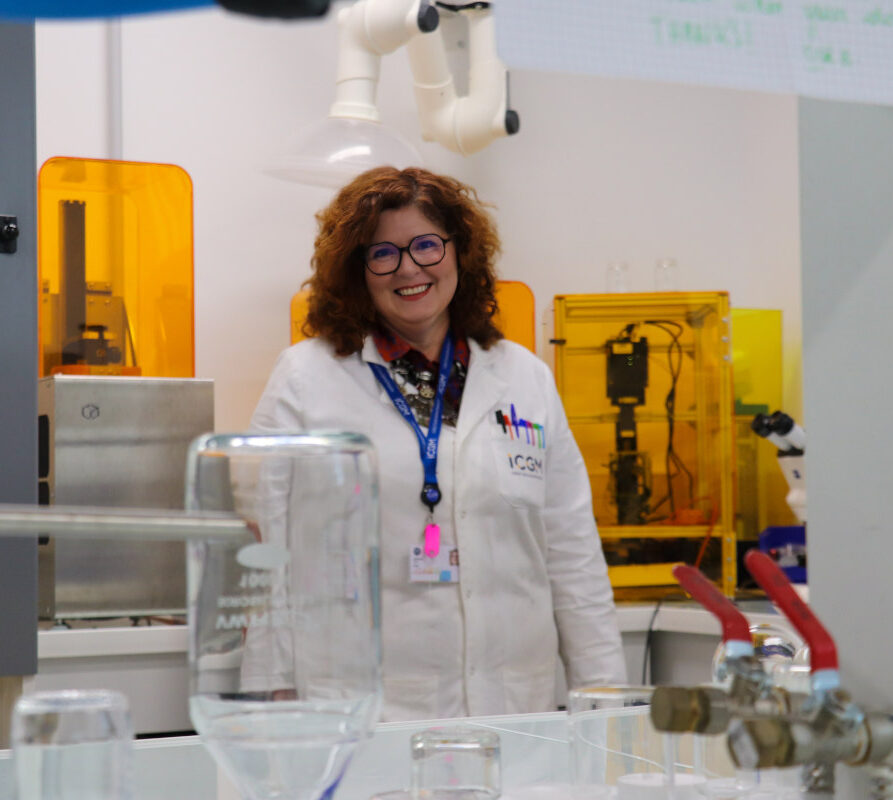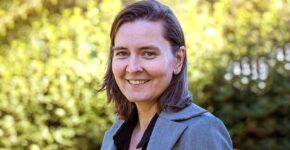Silvia Giordani: Nano-onions in Every Sauce
Thanks to the MAK'IT program (Montpellier Advanced Knowledge Institute on Transitions), Silvia Giordani is weaving collaborations with several UM laboratories around her nanomaterials research. The Dublin City University professor is taking advantage of this to extend the biomedical applications of her carbon nano-onions to fields other than medicine, particulary energy.

Silvia Giordani's visit to the Institut Charles Gerhardt de Montpellier (ICGM), for a few months is an opportunity to catch her on the fly. After a few false leads. While her red hair fits in with her signature as a professor at Dublin City University (DCU), the Irish cliché quickly fades: as her name suggests, Silvia Giordani is Italian. And when she playfully recalls her beginnings at the UM back in the late 1990s, she leads us astray again, since her arrival in Montpellier is a first. Her UMs were the University of Milan and then the University of Miami, where she carried out her PhD thesis. This researcher, who radiates an infectious vitality in the space of a few minutes, has made her mark. Describing herself as a " crazy scientist, always excited about new projects," she's got energy to spare, and it's taken a lot to get her where she is today.
A Reintegration Grant
After all, Silvia Giordani has had several careers. After her PhD in chemistry, thanks to a Marie Curie research grant, she went on to do a post-doctorate at Trinity College Dublin, then another at the University of Trieste with a Marie Curie reintegration grant, which finances the return of researchers to their country of origin. In 2007, everything accelerated. She was awarded the prestigious President of Ireland young researcher award, an Irish grant, the national equivalent of an ERC starting grant, worth 1.5 million euros, which allowed her to return to Trinity College, to set up her laboratory. As she took tea with the Irish president, she felt her "dream come true!". Her work on carbon nanomaterials showed promise for the treatment of cancers.
But no position awaited her at the end of these five fruitful years. She returned to Italy in 2013 to theIstituto Italiano di Tecnologia(IIT). While the institute encourages her work on carbon nanomaterials, she remembers having to 'put together another laboratory from scratch, in an empty basement...' Four years later, Silvia Giordani finally obtained an associate professorship in organic chemistry at the University of Turin. The following year, however, she was offered a senior professorship at Dublin's DCU University. She accepted the position.
"With my three lives as a researcher"
" It's been an interesting way toget to the top," says a magnanimous Silvia Giordani. The characteristics of the nanomaterials she has been developing over the last fifteen years - carbon nano-onions, as she calls them to illustrate their spherical shape composed of several layers - open up a wide range of applications. The researcher is mainly working on biomedical applications, as these nanostructures are capable of delivering treatments against cancerous tumor cells. " I published a paper this year on the value of nano-onions in the treatment of pancreatic cancer: cancer cells' resistance to treatment can be circumvented by encapsulating the drug in the nano-onions that will act on the cell ", she explains. She has just secured new Irish funding of 1.2 million euros over five years to work on brain cancers.
Student exchanges
Silvia Giordani is proud of the many collaborations she has forged at every stage of her career. " With My Three Lives as a Researcher, I have a richer experience than my counterparts who haven't moved. It's taught me a lot, including not to promise young researchers what you can't deliver! Today, I mentor female researchers, encouraging them to go where their skills are recognized. " The woman who can't seem to get enough of looking elsewhere has also benefited from scientific visits to New Zealand and Japan. This time, it's France, with a view to fulfilling an old dream: becoming a French speaker. It remains to be seen whether the speed with which she learns the language will be as fast as that of her professional collaborations. After just one month, the researcher has already launched projects with three laboratories at the University of Montpellier.
"My entry point here was Nicolas Brun from ICGM for a project using nano-onions in the development of bioelectrodes. This is a new application in the green energy sector, whereas her work on nanomaterials had previously been specialized in the field of health. She is also starting collaborations with the Charles Coulomb Laboratory (L2C) on spectroscopy and with the Max Mousseron Biomolecules Institute in biomedicine. Silvia Giordani also aims to launch student exchange and joint PhD programs between the Montpellier and Dublin institutions. She concludes with a word of gratitude for the MAK'IT team, which, in addition to providing scientific support, offers an integration program that has helped her settle into social life in Montpellier.
